Psychology Assignment 2022
VerifiedAdded on 2022/10/17
|8
|1904
|42
Assignment
AI Summary
Contribute Materials
Your contribution can guide someone’s learning journey. Share your
documents today.
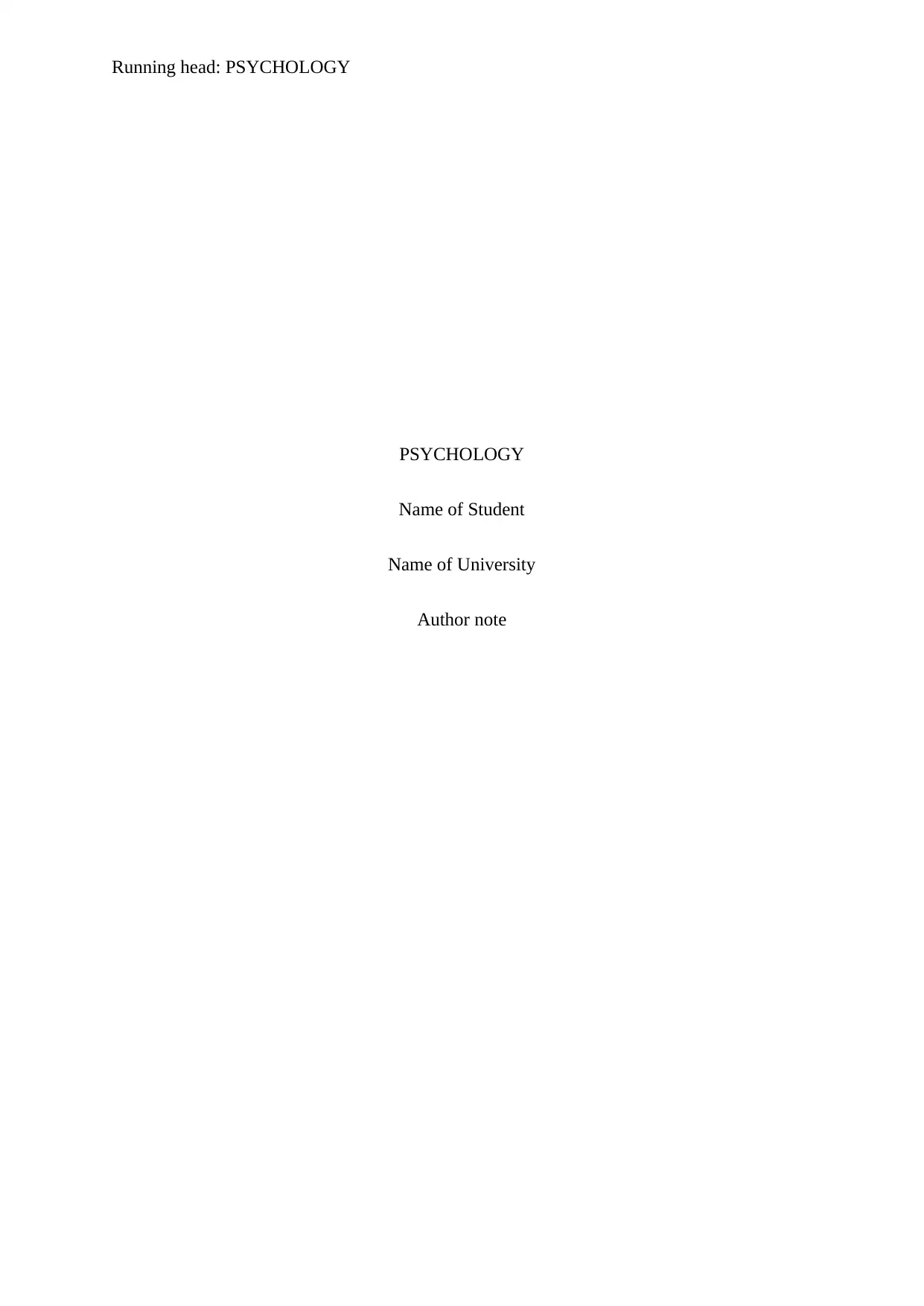
Running head: PSYCHOLOGY
PSYCHOLOGY
Name of Student
Name of University
Author note
PSYCHOLOGY
Name of Student
Name of University
Author note
Secure Best Marks with AI Grader
Need help grading? Try our AI Grader for instant feedback on your assignments.
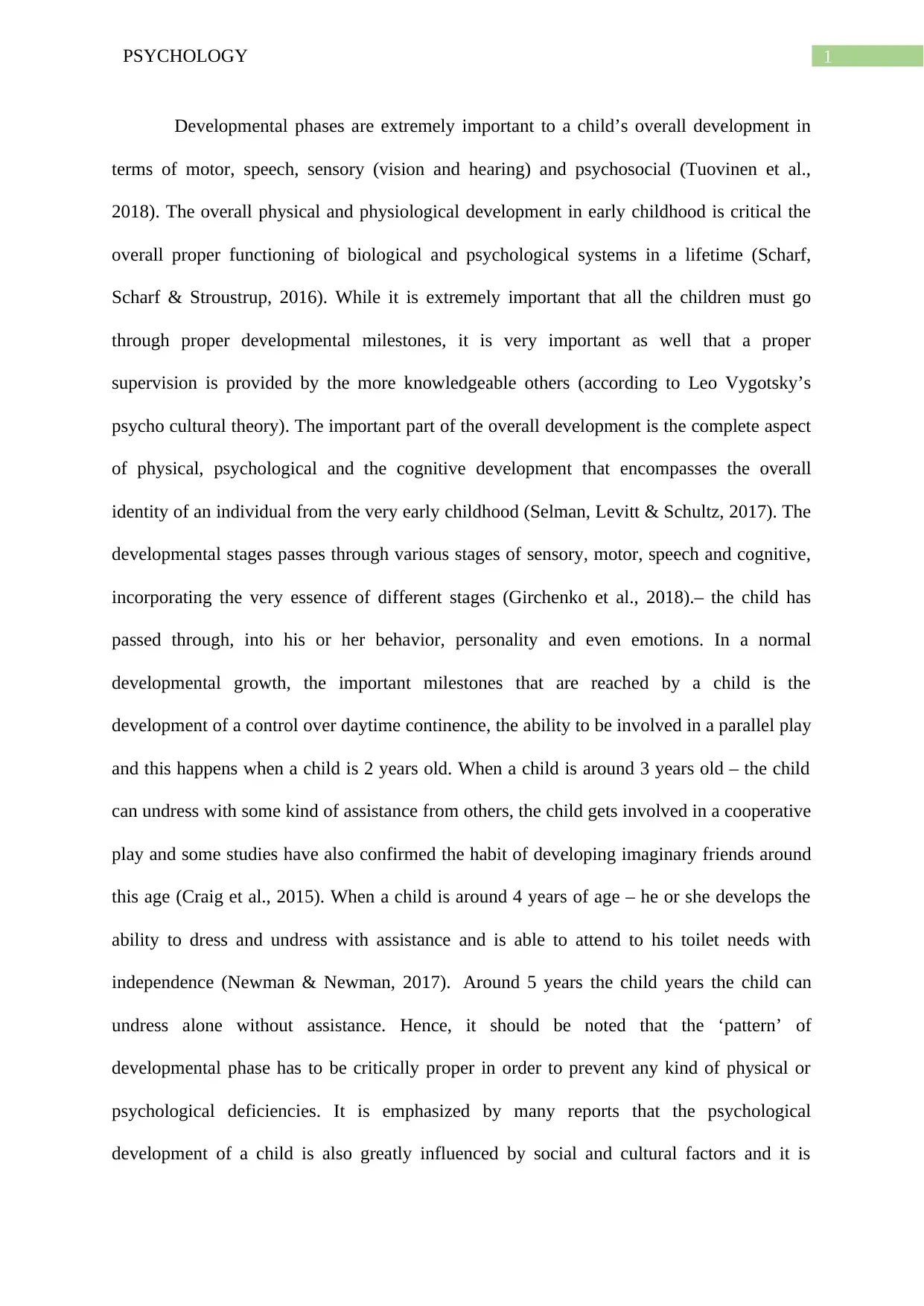
1PSYCHOLOGY
Developmental phases are extremely important to a child’s overall development in
terms of motor, speech, sensory (vision and hearing) and psychosocial (Tuovinen et al.,
2018). The overall physical and physiological development in early childhood is critical the
overall proper functioning of biological and psychological systems in a lifetime (Scharf,
Scharf & Stroustrup, 2016). While it is extremely important that all the children must go
through proper developmental milestones, it is very important as well that a proper
supervision is provided by the more knowledgeable others (according to Leo Vygotsky’s
psycho cultural theory). The important part of the overall development is the complete aspect
of physical, psychological and the cognitive development that encompasses the overall
identity of an individual from the very early childhood (Selman, Levitt & Schultz, 2017). The
developmental stages passes through various stages of sensory, motor, speech and cognitive,
incorporating the very essence of different stages (Girchenko et al., 2018).– the child has
passed through, into his or her behavior, personality and even emotions. In a normal
developmental growth, the important milestones that are reached by a child is the
development of a control over daytime continence, the ability to be involved in a parallel play
and this happens when a child is 2 years old. When a child is around 3 years old – the child
can undress with some kind of assistance from others, the child gets involved in a cooperative
play and some studies have also confirmed the habit of developing imaginary friends around
this age (Craig et al., 2015). When a child is around 4 years of age – he or she develops the
ability to dress and undress with assistance and is able to attend to his toilet needs with
independence (Newman & Newman, 2017). Around 5 years the child years the child can
undress alone without assistance. Hence, it should be noted that the ‘pattern’ of
developmental phase has to be critically proper in order to prevent any kind of physical or
psychological deficiencies. It is emphasized by many reports that the psychological
development of a child is also greatly influenced by social and cultural factors and it is
Developmental phases are extremely important to a child’s overall development in
terms of motor, speech, sensory (vision and hearing) and psychosocial (Tuovinen et al.,
2018). The overall physical and physiological development in early childhood is critical the
overall proper functioning of biological and psychological systems in a lifetime (Scharf,
Scharf & Stroustrup, 2016). While it is extremely important that all the children must go
through proper developmental milestones, it is very important as well that a proper
supervision is provided by the more knowledgeable others (according to Leo Vygotsky’s
psycho cultural theory). The important part of the overall development is the complete aspect
of physical, psychological and the cognitive development that encompasses the overall
identity of an individual from the very early childhood (Selman, Levitt & Schultz, 2017). The
developmental stages passes through various stages of sensory, motor, speech and cognitive,
incorporating the very essence of different stages (Girchenko et al., 2018).– the child has
passed through, into his or her behavior, personality and even emotions. In a normal
developmental growth, the important milestones that are reached by a child is the
development of a control over daytime continence, the ability to be involved in a parallel play
and this happens when a child is 2 years old. When a child is around 3 years old – the child
can undress with some kind of assistance from others, the child gets involved in a cooperative
play and some studies have also confirmed the habit of developing imaginary friends around
this age (Craig et al., 2015). When a child is around 4 years of age – he or she develops the
ability to dress and undress with assistance and is able to attend to his toilet needs with
independence (Newman & Newman, 2017). Around 5 years the child years the child can
undress alone without assistance. Hence, it should be noted that the ‘pattern’ of
developmental phase has to be critically proper in order to prevent any kind of physical or
psychological deficiencies. It is emphasized by many reports that the psychological
development of a child is also greatly influenced by social and cultural factors and it is
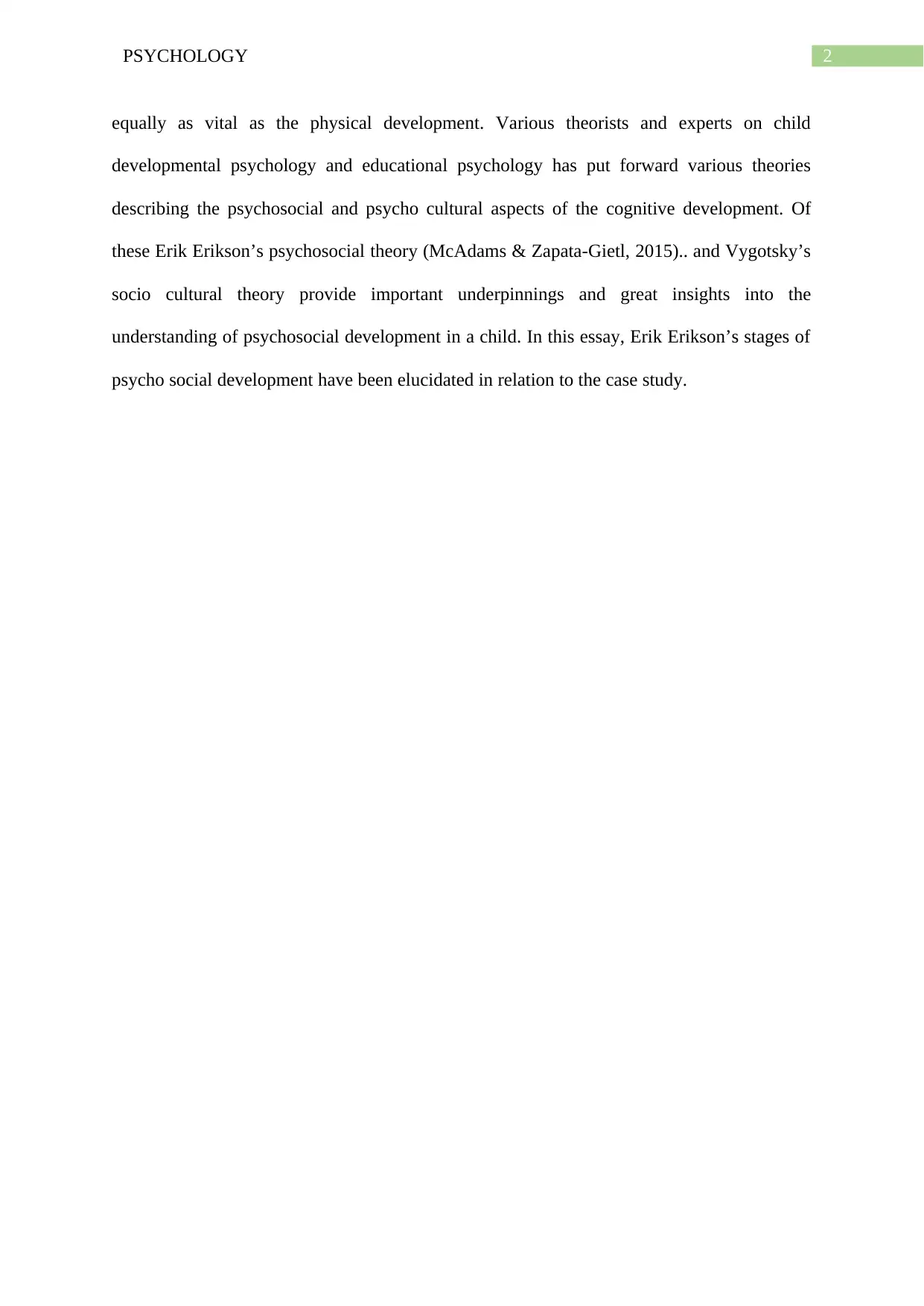
2PSYCHOLOGY
equally as vital as the physical development. Various theorists and experts on child
developmental psychology and educational psychology has put forward various theories
describing the psychosocial and psycho cultural aspects of the cognitive development. Of
these Erik Erikson’s psychosocial theory (McAdams & Zapata-Gietl, 2015).. and Vygotsky’s
socio cultural theory provide important underpinnings and great insights into the
understanding of psychosocial development in a child. In this essay, Erik Erikson’s stages of
psycho social development have been elucidated in relation to the case study.
equally as vital as the physical development. Various theorists and experts on child
developmental psychology and educational psychology has put forward various theories
describing the psychosocial and psycho cultural aspects of the cognitive development. Of
these Erik Erikson’s psychosocial theory (McAdams & Zapata-Gietl, 2015).. and Vygotsky’s
socio cultural theory provide important underpinnings and great insights into the
understanding of psychosocial development in a child. In this essay, Erik Erikson’s stages of
psycho social development have been elucidated in relation to the case study.
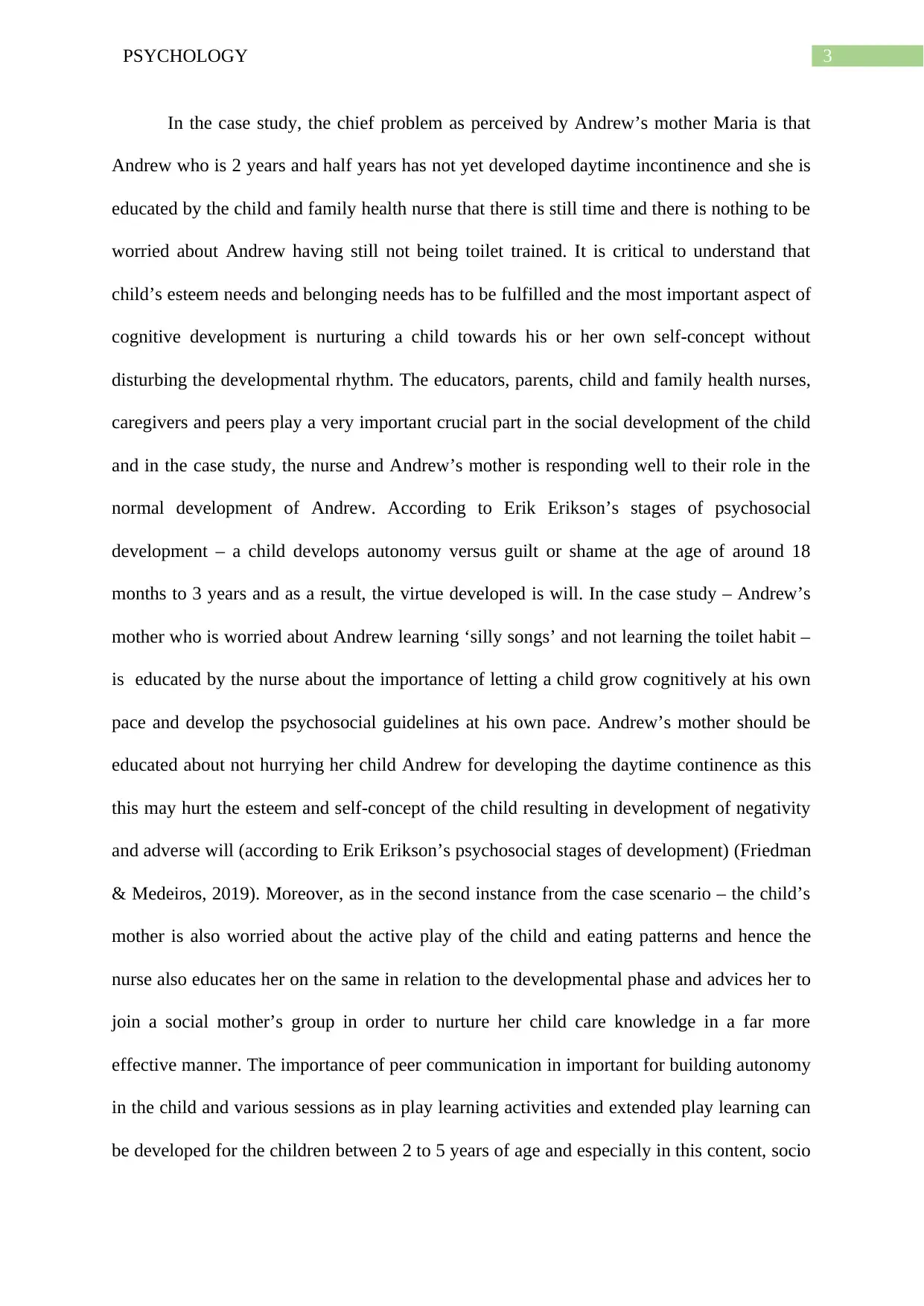
3PSYCHOLOGY
In the case study, the chief problem as perceived by Andrew’s mother Maria is that
Andrew who is 2 years and half years has not yet developed daytime incontinence and she is
educated by the child and family health nurse that there is still time and there is nothing to be
worried about Andrew having still not being toilet trained. It is critical to understand that
child’s esteem needs and belonging needs has to be fulfilled and the most important aspect of
cognitive development is nurturing a child towards his or her own self-concept without
disturbing the developmental rhythm. The educators, parents, child and family health nurses,
caregivers and peers play a very important crucial part in the social development of the child
and in the case study, the nurse and Andrew’s mother is responding well to their role in the
normal development of Andrew. According to Erik Erikson’s stages of psychosocial
development – a child develops autonomy versus guilt or shame at the age of around 18
months to 3 years and as a result, the virtue developed is will. In the case study – Andrew’s
mother who is worried about Andrew learning ‘silly songs’ and not learning the toilet habit –
is educated by the nurse about the importance of letting a child grow cognitively at his own
pace and develop the psychosocial guidelines at his own pace. Andrew’s mother should be
educated about not hurrying her child Andrew for developing the daytime continence as this
this may hurt the esteem and self-concept of the child resulting in development of negativity
and adverse will (according to Erik Erikson’s psychosocial stages of development) (Friedman
& Medeiros, 2019). Moreover, as in the second instance from the case scenario – the child’s
mother is also worried about the active play of the child and eating patterns and hence the
nurse also educates her on the same in relation to the developmental phase and advices her to
join a social mother’s group in order to nurture her child care knowledge in a far more
effective manner. The importance of peer communication in important for building autonomy
in the child and various sessions as in play learning activities and extended play learning can
be developed for the children between 2 to 5 years of age and especially in this content, socio
In the case study, the chief problem as perceived by Andrew’s mother Maria is that
Andrew who is 2 years and half years has not yet developed daytime incontinence and she is
educated by the child and family health nurse that there is still time and there is nothing to be
worried about Andrew having still not being toilet trained. It is critical to understand that
child’s esteem needs and belonging needs has to be fulfilled and the most important aspect of
cognitive development is nurturing a child towards his or her own self-concept without
disturbing the developmental rhythm. The educators, parents, child and family health nurses,
caregivers and peers play a very important crucial part in the social development of the child
and in the case study, the nurse and Andrew’s mother is responding well to their role in the
normal development of Andrew. According to Erik Erikson’s stages of psychosocial
development – a child develops autonomy versus guilt or shame at the age of around 18
months to 3 years and as a result, the virtue developed is will. In the case study – Andrew’s
mother who is worried about Andrew learning ‘silly songs’ and not learning the toilet habit –
is educated by the nurse about the importance of letting a child grow cognitively at his own
pace and develop the psychosocial guidelines at his own pace. Andrew’s mother should be
educated about not hurrying her child Andrew for developing the daytime continence as this
this may hurt the esteem and self-concept of the child resulting in development of negativity
and adverse will (according to Erik Erikson’s psychosocial stages of development) (Friedman
& Medeiros, 2019). Moreover, as in the second instance from the case scenario – the child’s
mother is also worried about the active play of the child and eating patterns and hence the
nurse also educates her on the same in relation to the developmental phase and advices her to
join a social mother’s group in order to nurture her child care knowledge in a far more
effective manner. The importance of peer communication in important for building autonomy
in the child and various sessions as in play learning activities and extended play learning can
be developed for the children between 2 to 5 years of age and especially in this content, socio
Secure Best Marks with AI Grader
Need help grading? Try our AI Grader for instant feedback on your assignments.
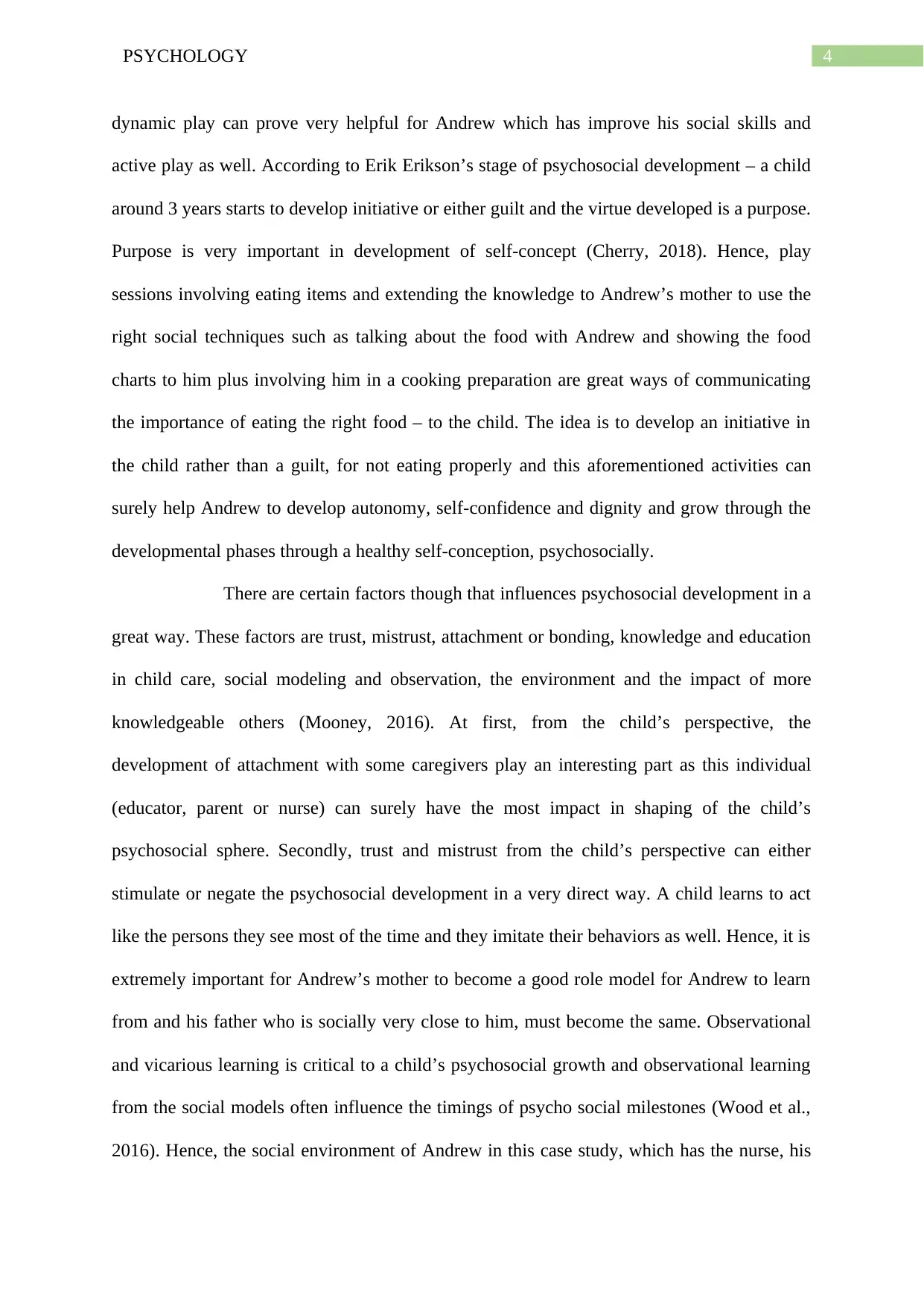
4PSYCHOLOGY
dynamic play can prove very helpful for Andrew which has improve his social skills and
active play as well. According to Erik Erikson’s stage of psychosocial development – a child
around 3 years starts to develop initiative or either guilt and the virtue developed is a purpose.
Purpose is very important in development of self-concept (Cherry, 2018). Hence, play
sessions involving eating items and extending the knowledge to Andrew’s mother to use the
right social techniques such as talking about the food with Andrew and showing the food
charts to him plus involving him in a cooking preparation are great ways of communicating
the importance of eating the right food – to the child. The idea is to develop an initiative in
the child rather than a guilt, for not eating properly and this aforementioned activities can
surely help Andrew to develop autonomy, self-confidence and dignity and grow through the
developmental phases through a healthy self-conception, psychosocially.
There are certain factors though that influences psychosocial development in a
great way. These factors are trust, mistrust, attachment or bonding, knowledge and education
in child care, social modeling and observation, the environment and the impact of more
knowledgeable others (Mooney, 2016). At first, from the child’s perspective, the
development of attachment with some caregivers play an interesting part as this individual
(educator, parent or nurse) can surely have the most impact in shaping of the child’s
psychosocial sphere. Secondly, trust and mistrust from the child’s perspective can either
stimulate or negate the psychosocial development in a very direct way. A child learns to act
like the persons they see most of the time and they imitate their behaviors as well. Hence, it is
extremely important for Andrew’s mother to become a good role model for Andrew to learn
from and his father who is socially very close to him, must become the same. Observational
and vicarious learning is critical to a child’s psychosocial growth and observational learning
from the social models often influence the timings of psycho social milestones (Wood et al.,
2016). Hence, the social environment of Andrew in this case study, which has the nurse, his
dynamic play can prove very helpful for Andrew which has improve his social skills and
active play as well. According to Erik Erikson’s stage of psychosocial development – a child
around 3 years starts to develop initiative or either guilt and the virtue developed is a purpose.
Purpose is very important in development of self-concept (Cherry, 2018). Hence, play
sessions involving eating items and extending the knowledge to Andrew’s mother to use the
right social techniques such as talking about the food with Andrew and showing the food
charts to him plus involving him in a cooking preparation are great ways of communicating
the importance of eating the right food – to the child. The idea is to develop an initiative in
the child rather than a guilt, for not eating properly and this aforementioned activities can
surely help Andrew to develop autonomy, self-confidence and dignity and grow through the
developmental phases through a healthy self-conception, psychosocially.
There are certain factors though that influences psychosocial development in a
great way. These factors are trust, mistrust, attachment or bonding, knowledge and education
in child care, social modeling and observation, the environment and the impact of more
knowledgeable others (Mooney, 2016). At first, from the child’s perspective, the
development of attachment with some caregivers play an interesting part as this individual
(educator, parent or nurse) can surely have the most impact in shaping of the child’s
psychosocial sphere. Secondly, trust and mistrust from the child’s perspective can either
stimulate or negate the psychosocial development in a very direct way. A child learns to act
like the persons they see most of the time and they imitate their behaviors as well. Hence, it is
extremely important for Andrew’s mother to become a good role model for Andrew to learn
from and his father who is socially very close to him, must become the same. Observational
and vicarious learning is critical to a child’s psychosocial growth and observational learning
from the social models often influence the timings of psycho social milestones (Wood et al.,
2016). Hence, the social environment of Andrew in this case study, which has the nurse, his
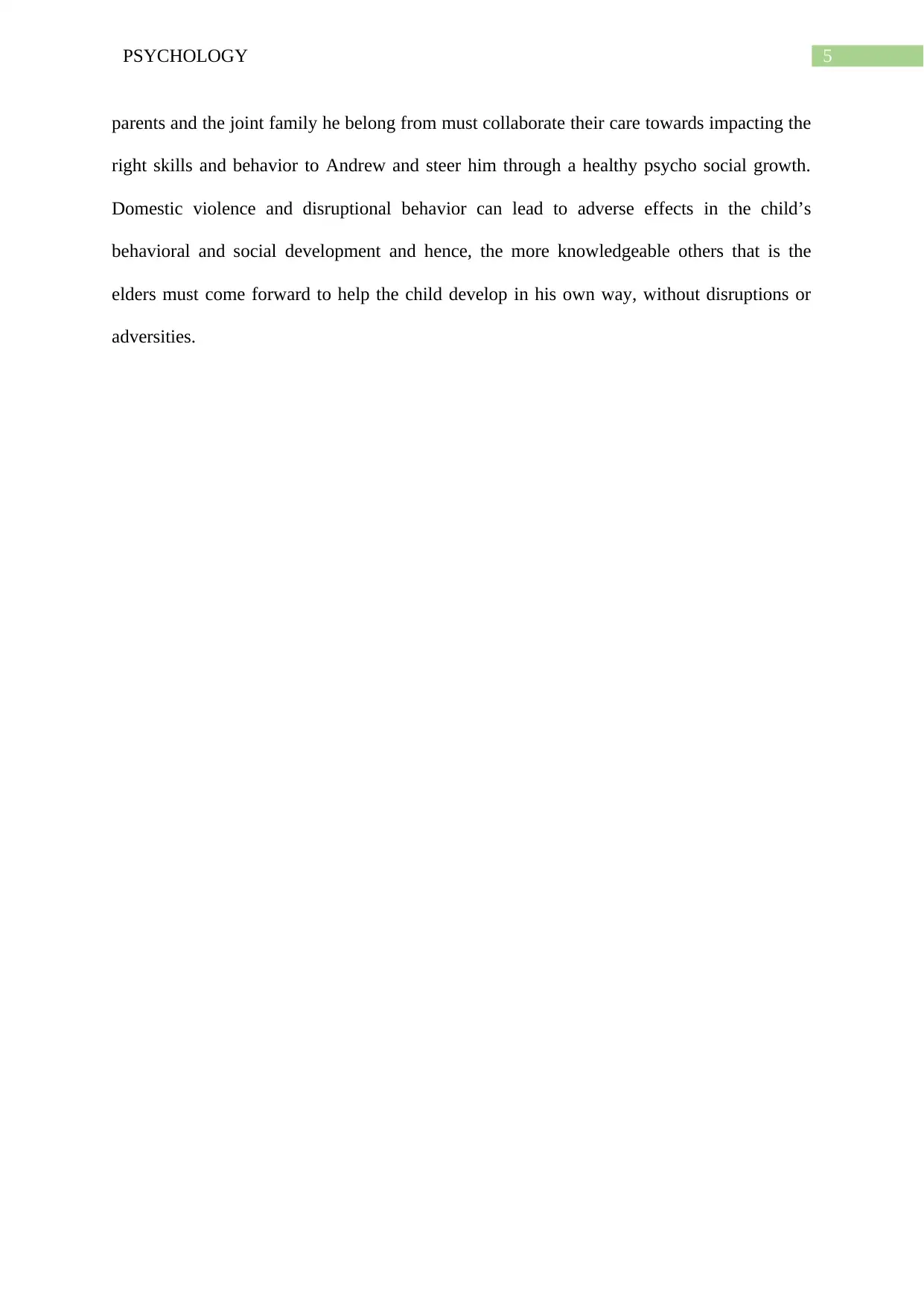
5PSYCHOLOGY
parents and the joint family he belong from must collaborate their care towards impacting the
right skills and behavior to Andrew and steer him through a healthy psycho social growth.
Domestic violence and disruptional behavior can lead to adverse effects in the child’s
behavioral and social development and hence, the more knowledgeable others that is the
elders must come forward to help the child develop in his own way, without disruptions or
adversities.
parents and the joint family he belong from must collaborate their care towards impacting the
right skills and behavior to Andrew and steer him through a healthy psycho social growth.
Domestic violence and disruptional behavior can lead to adverse effects in the child’s
behavioral and social development and hence, the more knowledgeable others that is the
elders must come forward to help the child develop in his own way, without disruptions or
adversities.
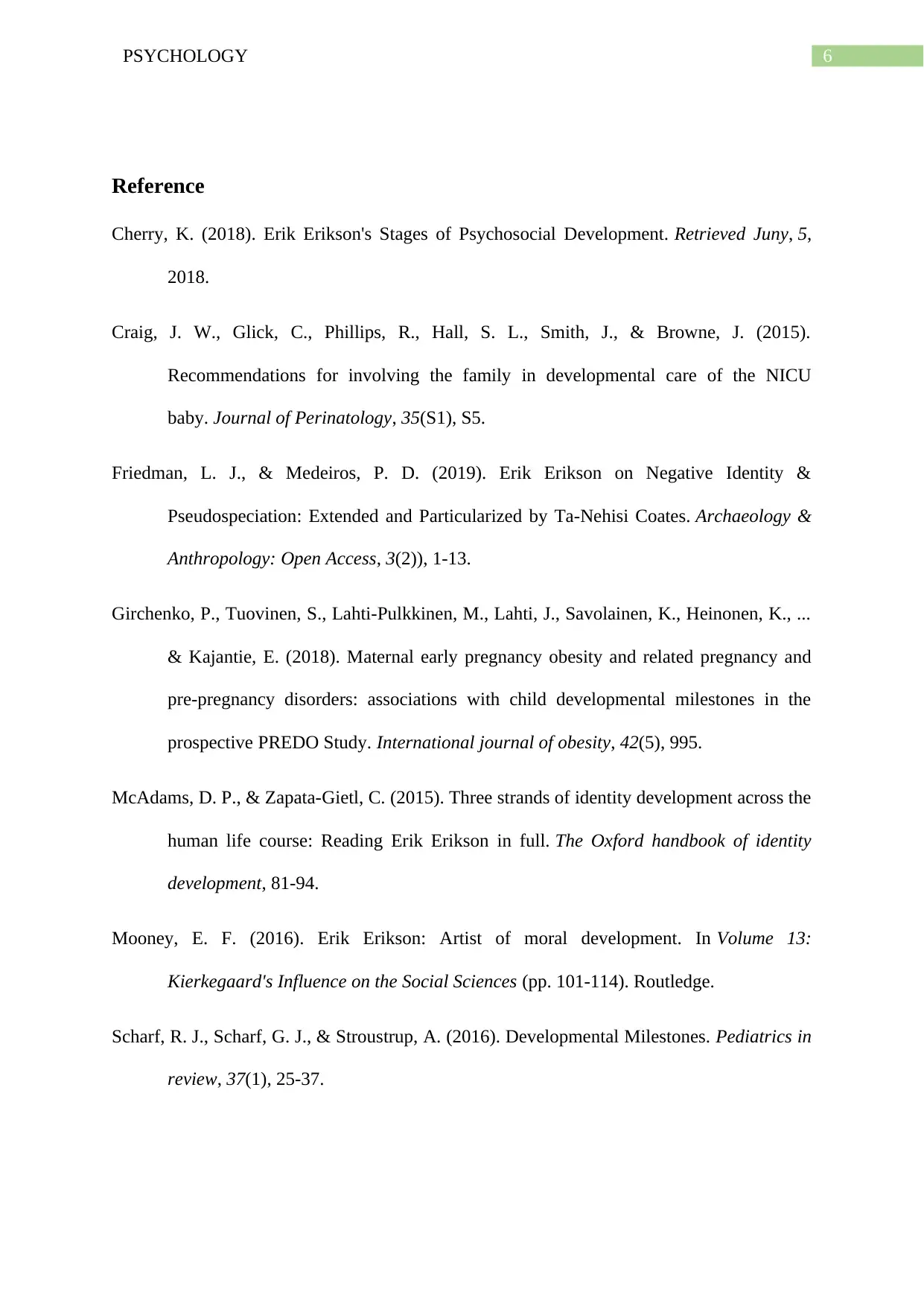
6PSYCHOLOGY
Reference
Cherry, K. (2018). Erik Erikson's Stages of Psychosocial Development. Retrieved Juny, 5,
2018.
Craig, J. W., Glick, C., Phillips, R., Hall, S. L., Smith, J., & Browne, J. (2015).
Recommendations for involving the family in developmental care of the NICU
baby. Journal of Perinatology, 35(S1), S5.
Friedman, L. J., & Medeiros, P. D. (2019). Erik Erikson on Negative Identity &
Pseudospeciation: Extended and Particularized by Ta-Nehisi Coates. Archaeology &
Anthropology: Open Access, 3(2)), 1-13.
Girchenko, P., Tuovinen, S., Lahti-Pulkkinen, M., Lahti, J., Savolainen, K., Heinonen, K., ...
& Kajantie, E. (2018). Maternal early pregnancy obesity and related pregnancy and
pre-pregnancy disorders: associations with child developmental milestones in the
prospective PREDO Study. International journal of obesity, 42(5), 995.
McAdams, D. P., & Zapata-Gietl, C. (2015). Three strands of identity development across the
human life course: Reading Erik Erikson in full. The Oxford handbook of identity
development, 81-94.
Mooney, E. F. (2016). Erik Erikson: Artist of moral development. In Volume 13:
Kierkegaard's Influence on the Social Sciences (pp. 101-114). Routledge.
Scharf, R. J., Scharf, G. J., & Stroustrup, A. (2016). Developmental Milestones. Pediatrics in
review, 37(1), 25-37.
Reference
Cherry, K. (2018). Erik Erikson's Stages of Psychosocial Development. Retrieved Juny, 5,
2018.
Craig, J. W., Glick, C., Phillips, R., Hall, S. L., Smith, J., & Browne, J. (2015).
Recommendations for involving the family in developmental care of the NICU
baby. Journal of Perinatology, 35(S1), S5.
Friedman, L. J., & Medeiros, P. D. (2019). Erik Erikson on Negative Identity &
Pseudospeciation: Extended and Particularized by Ta-Nehisi Coates. Archaeology &
Anthropology: Open Access, 3(2)), 1-13.
Girchenko, P., Tuovinen, S., Lahti-Pulkkinen, M., Lahti, J., Savolainen, K., Heinonen, K., ...
& Kajantie, E. (2018). Maternal early pregnancy obesity and related pregnancy and
pre-pregnancy disorders: associations with child developmental milestones in the
prospective PREDO Study. International journal of obesity, 42(5), 995.
McAdams, D. P., & Zapata-Gietl, C. (2015). Three strands of identity development across the
human life course: Reading Erik Erikson in full. The Oxford handbook of identity
development, 81-94.
Mooney, E. F. (2016). Erik Erikson: Artist of moral development. In Volume 13:
Kierkegaard's Influence on the Social Sciences (pp. 101-114). Routledge.
Scharf, R. J., Scharf, G. J., & Stroustrup, A. (2016). Developmental Milestones. Pediatrics in
review, 37(1), 25-37.
Paraphrase This Document
Need a fresh take? Get an instant paraphrase of this document with our AI Paraphraser
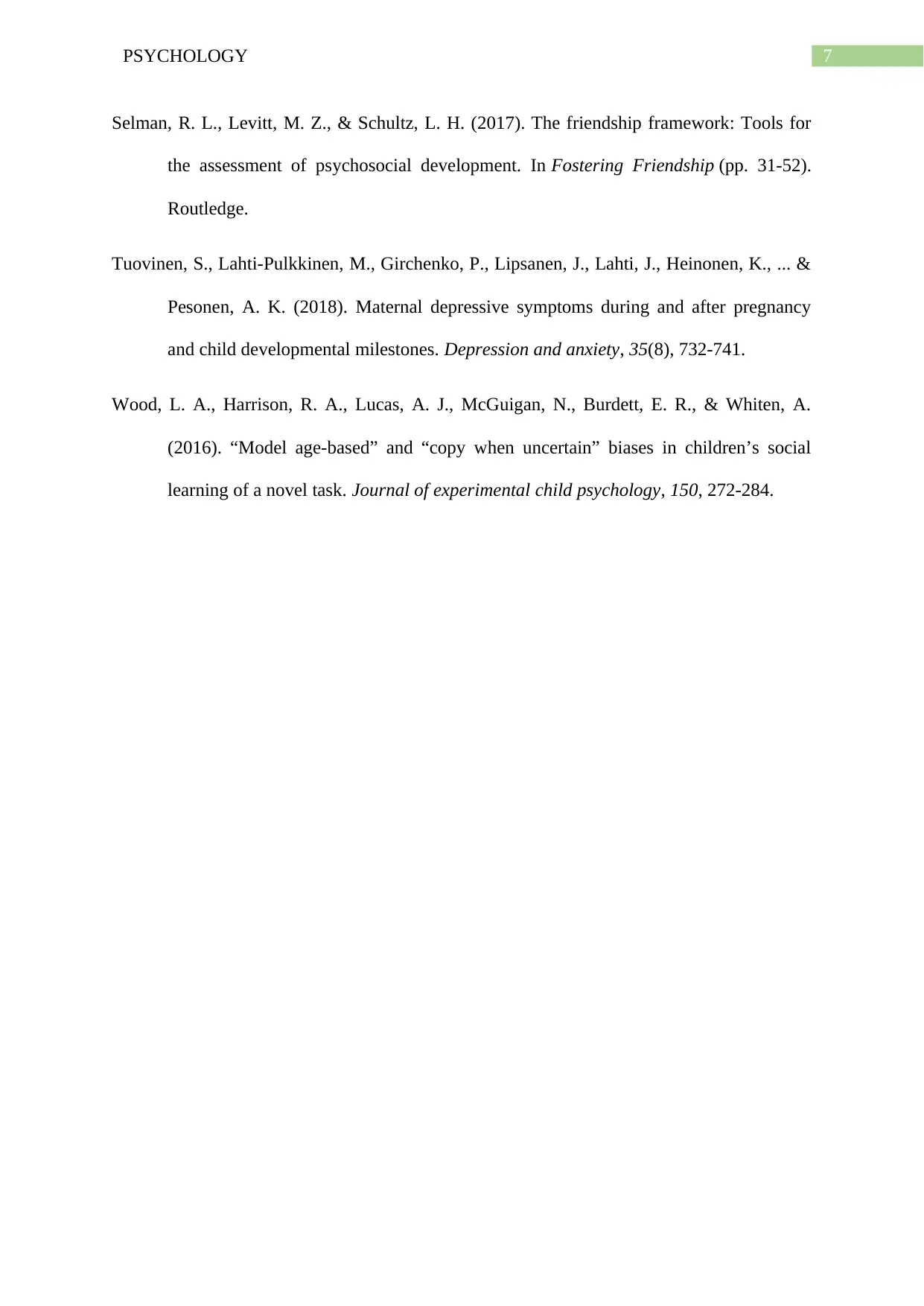
7PSYCHOLOGY
Selman, R. L., Levitt, M. Z., & Schultz, L. H. (2017). The friendship framework: Tools for
the assessment of psychosocial development. In Fostering Friendship (pp. 31-52).
Routledge.
Tuovinen, S., Lahti‐Pulkkinen, M., Girchenko, P., Lipsanen, J., Lahti, J., Heinonen, K., ... &
Pesonen, A. K. (2018). Maternal depressive symptoms during and after pregnancy
and child developmental milestones. Depression and anxiety, 35(8), 732-741.
Wood, L. A., Harrison, R. A., Lucas, A. J., McGuigan, N., Burdett, E. R., & Whiten, A.
(2016). “Model age-based” and “copy when uncertain” biases in children’s social
learning of a novel task. Journal of experimental child psychology, 150, 272-284.
Selman, R. L., Levitt, M. Z., & Schultz, L. H. (2017). The friendship framework: Tools for
the assessment of psychosocial development. In Fostering Friendship (pp. 31-52).
Routledge.
Tuovinen, S., Lahti‐Pulkkinen, M., Girchenko, P., Lipsanen, J., Lahti, J., Heinonen, K., ... &
Pesonen, A. K. (2018). Maternal depressive symptoms during and after pregnancy
and child developmental milestones. Depression and anxiety, 35(8), 732-741.
Wood, L. A., Harrison, R. A., Lucas, A. J., McGuigan, N., Burdett, E. R., & Whiten, A.
(2016). “Model age-based” and “copy when uncertain” biases in children’s social
learning of a novel task. Journal of experimental child psychology, 150, 272-284.
1 out of 8
Related Documents
Your All-in-One AI-Powered Toolkit for Academic Success.
+13062052269
info@desklib.com
Available 24*7 on WhatsApp / Email
![[object Object]](/_next/static/media/star-bottom.7253800d.svg)
Unlock your academic potential
© 2024 | Zucol Services PVT LTD | All rights reserved.





